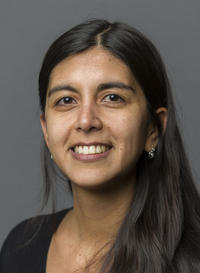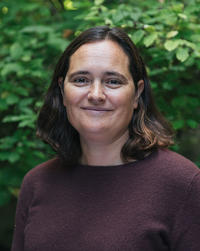Three Oxford chemists win prestigious Royal Society of Chemistry prizes
Three Oxford chemists win prestigious Royal Society of Chemistry prizes
Professors Fernanda Duarte, Andrew Goodwin and Charlotte Williams have been named winners of prizes from the Royal Society of Chemistry, celebrating the most exciting chemical science taking place today.
Professor Fernanda Duarte won the Harrison-Meldola Memorial Prize for introducing multidisciplinary approaches to rationalise complex (bio)chemical reaction mechanisms, guiding rational molecular design. Professor Goodwin won the Peter Day Award for studies of structural complexity in framework materials. Professor Williams won the Tilden Prize for contributions to sustainable polymer chemistry. Each winner receives a cash prize and a medal.

Professor Duarte said: “I am honoured to receive this recognition which goes to my amazing team. I am thankful to all the people that have made this achievement possible, from students to mentors and family.”
The discovery of new molecules is crucial to modern societies. However, the process of transforming molecular sketches into real applications, such as new types of batteries or drugs, is often slow and expensive, requiring many expert scientists and hours of work. As computational chemists, Professor Duarte’s team use computers as 'molecular microscopes' to understand how reactions occur at a molecular level, from simple reactions in solution to more complex biomolecular processes. Her team develops predictive models and computational tools to gain fundamental understanding of such processes and aid the optimisation and discovery of novel molecules to tackle industrial and societal challenges.

Professor Goodwin said: “I am thrilled and humbled to receive the Peter Day Award, named after a true giant of the field, sadly missed. The award recognises also the hard work and creativity of the many talented students, post-docs and collaborators with whom I have had the privilege to work and from whom I have learned so much."
Professor Goodwin’s research exploits advanced X-ray and neutron scattering methods to study the nature and implications of complex atomic arrangements within functional materials. Understanding this complexity and its functional role is a significant challenge, and one that interfaces with difficult problems in condensed-matter physics, geometry, and crystallography.
While Professor Goodwin’s work is unashamedly fundamental in its focus, it is of direct relevance to fields as diverse as pharmaceutical science and renewable energy.

Professor Williams said: “I am delighted and honoured to be awarded the RSC Tilden Medal. All my research is conducted within teams both in the university and industry sectors. I sincerely thank and acknowledge the hard-work, inspiration and collaboration with all my postgraduate students, postdoctoral researchers, academic and industrial collaborators, past and present.”
Professor Williams’s research includes development of homogenous polymerization catalysts and the study of polyesters/carbonates and ethers. The team have discovered new ways to use and recycle renewable resources, such as plants or carbon dioxide, to make precise polymer structures showing properties suitable for use as plastics, elastomers, coatings, adhesives and within fibre reinforced composites. Her team research catalysts for carbon dioxide/epoxide copolymerization. Recent advances include synergic heterodinuclear catalysts, based on Zn(II), Mg(II) and Co(II), together with the first insights into the thermodynamic and kinetic factors underpinning catalytic synergy. The team also discovered a form of switchable polymerization catalysis whereby monomer mixtures are selectively enchained into specific block polymer structures; in this catalysis the polymerization is switched by presence/absence of key monomers. Recently, the Williams group used switchable catalysts to selectively place carbon dioxide into polymer backbones to improve plastic ductility and furnish high peel force pressure sensitive adhesives.
Dr Helen Pain, Chief Executive of the Royal Society of Chemistry, said: “All of us have experienced tremendous challenges in the last year and the chemical sciences community has been integral to how the world has responded on a number of levels. From developing vaccines for COVID-19 to continuing to work towards a more sustainable world – the contribution of chemical scientists has never been more tangible or important.
“In a recent review of our recognition portfolio, we committed to ensuring that our prizes reflected the incredible diversity and excellence of chemistry being carried out today. The work of these three winners is a prime example of what we are so passionate about and we are proud to recognise this contribution with these prizes.”
The Royal Society of Chemistry’s prizes have recognised excellence in the chemical sciences for more than 150 years. In 2019, the organisation announced the biggest overhaul of this portfolio in its history, designed to better reflect modern science. The Research and Innovation Prizes celebrate brilliant individuals across industry and academia. They include prizes for those at different career stages in general chemistry and for those working in specific fields, as well as interdisciplinary prizes and prizes for those in specific roles.
Of those to have won a Royal Society of Chemistry Prize, over 50 have gone on to win Nobel Prizes for their pioneering work, including 2019 Nobel laureate John B Goodenough.
For more information about the RSC’s modern Prizes portfolio, visit rsc.li/prizes.




